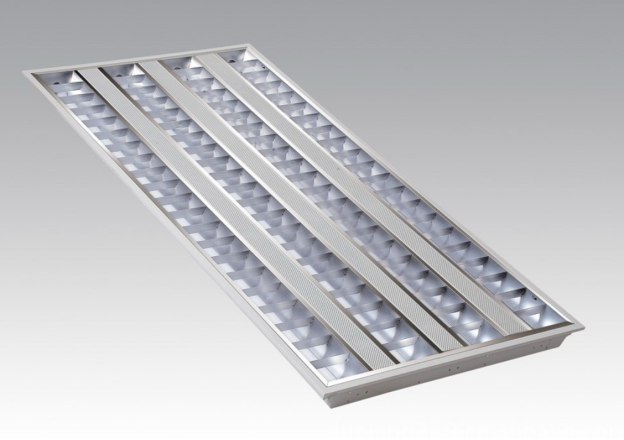LED light fixtures are highly popular by now and every space is equipped with them. However, when it comes to installing LED light fixtures, the major concern people may have is whether LED lights need to be grounded or not.
LED lights operate at low voltage, and the construction is also different; they have LED drivers that convert the incoming voltage for LED lights to lower voltage, which reduces the chance of electric shock. Hence, the need for grounding is minimized.
If you are looking forward to learning more about the grounding of LED lights, you are at the right place; this guide below will give you an insight into a lot of information, so let’s read below:

What is the Grounding/Earthing of Power Supplies?
Ground and earthing are the same thing and it refers to a measure of protection and safety in the electrical systems. The electrical wires of the devices are connected to the earth’s ground reference point.
The main aim of electronic devices grounded is to help avoid the chance of electric shock, and in case of any short circuits, the dissipation of these into the ground protects against hazards.
Which Power supplies need to be grounded?
The power supplies that need to be grounded include the following:
- Power supplies operating a very high voltage, which is over 50 volts, require ground, and this comprises various appliances and industrial equipment.
- A power supply that has a metal case requires grounding; the metal case energizes in case of an electrical fault, and to protect from electric shock, grounding is important.
- Various household appliances also need grounding, like power tools and washing machines, to ensure safety.
Which Power supplies don’t need to be grounded?
Certain power supplies do not need grounding, and these comprise the following:
- Power supplies that operate on low voltage, like phones, laptops, and other such gadgets or light fixtures, have no ground wire as they also operate at low voltage.
- Some devices are equipped with double insulation, and due to the extra insulation, the need for grounding is eliminated.
- Some battery-powered devices also do not need grounding as they are not connected to the electricity grid.
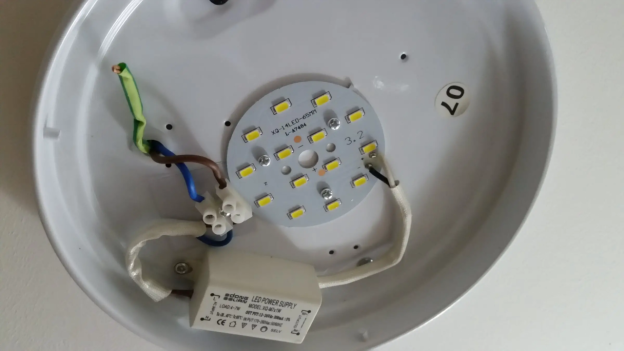
Do LED Light Fixtures Need Earthing?
There is no ground wire in the LED light fixture in its base. The LED lights have double insulation, which means that they offer an extra layer of insulation to ensure that protection against electric shock is achieved. However, it is suggested to adhere to the guidelines offered by manufacturers to ensure that the LED codes are adhered to.
Will An LED Light Fixture Work If Not Grounded?
Yes, LED light fixtures without a ground wire will work properly. This is because the main purpose of grounding is to ensure the creation of a safe path for the currents to dissipate in the event of a fault. The LED lights are designed in a way that they operate at a lower voltage, and hence, the risk of electrical hazard is also low, which eliminates the need for grounding of these lights.
What Happens If You Don’t Ground An LED Light Fixture?
There is no need for the LED light fixture to be grounded separately; the fixture does not contain any kind of grounding wire, so there is no need to have a separate grounding. The LED lights come with appropriate insulation, which eliminates the need for a separate grounding.
In a situation where you are having the LED installation done by an electrician or you have prepared the fixtures on your own, and the light has no grounding, then there won’t be any impact on the performance of the lights. The lights will work perfectly, and you will even realize that the lights are not grounded.
However, the only risk in such a case is that if the excessive voltage passes through the light fixture, the chance of fire damage or electric shock is high.
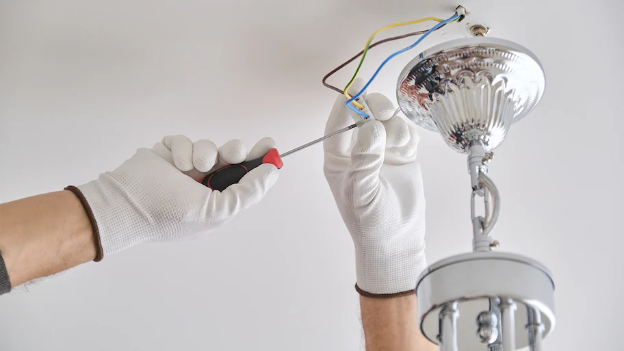
How Does Grounding an LED Light Fixture Prevent Injury and Damage?
The grounding of LED light fixtures proves to be a safety measure that helps to prevent input and damage in case of electrical failures and faults. Some of the ways it contributes to safety include the following:
Protection Against Faulty Current Path
In case of breakdown or short circuit, the electrical components that are insulated or grounded LED light fixtures ensure that a low resistance path is present for the fault currents so that they can safely travel to the ground. It ensures that the currents do not travel to the fixture and its conductive path, as it leads to an electrical shock if someone touches the metal surface that has faulty current.
Prevents Electric Shock
When LED lights are grounded, the groundings protect them against electric shock and offer a safe path for faulty currents. In the event of faulty currents traveling to the fixture lead, it energizes the metal parts of the fixture, which causes electric shocks. However, grounded LED lights ensure that the currents are directed away from the fixture towards the ground.
Ensures Voltage Stability
The reference point of voltage is stabilized by grounding; it ensures that the LED fixture and all of its components work properly. Moreover, when the voltage is maintained with stability, the risk of fluctuations is eliminated and protects the LED components from damage.
Compliance with Electrical Standards
The electrical regulations require the LED fixtures to be grounded in order to ensure safety. Hence, by having LED light fixtures grounded these regulations are adhered and also safety across the different applications is achieved.
Safety Against Fire Hazards
Appropriate grounding helps to prevent fire hazards; it reduces the risk of electrical sparks, and the faults are directed away from flammable materials, which reduces the chance of fire.
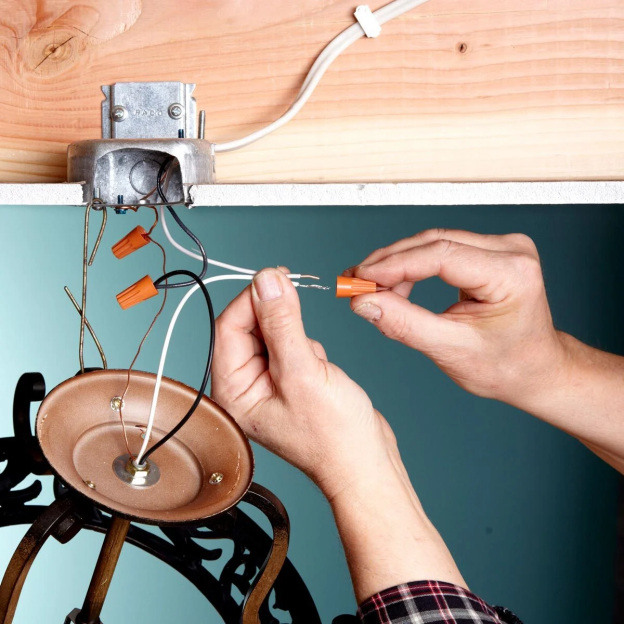
How do I know if my light fixture is grounded?
In order to determine whether the light fixture is grounded or not, there are different ways you can look forward; some of the steps that you can follow are given below:
Visual Inspection
- You can check the exterior of the light fixture and see if you can find any grounding wires that are visible; the ground wires usually are in copper or green color.
- If your light fixture has a metal electrical box on which it is mounted, then you can also search for the grounding wire, which may be connected to the mounting bracket.
- The manufacturer’s manual may also have relevant information about the grounding wire and where it is.
Wiring Inspection
In order to inspect the wiring, you can follow the below-given steps to ensure whether the ground wire is present in the fixture or not:
- First of all, turn off the power from the light fixture before you start any inspection.
- Now, carefully remove the fixture from the wall or ceiling, which allows you to have a look at the wire.
- As soon as you approach the wire that is connected to the fixture, look for a green or copper-colored wire, which is the grounding wire.
- In the case where the light fixture is mounted on a metal box, then look for the grounding wire, which may be attached to the box.
Inspecting Through Circuit Tester
- Turn the power off from the circuit breaker.
- Use a circuit tester and check the voltage between the black and green or copper wire. In case there is no voltage, it means that the light fixture is grounded.
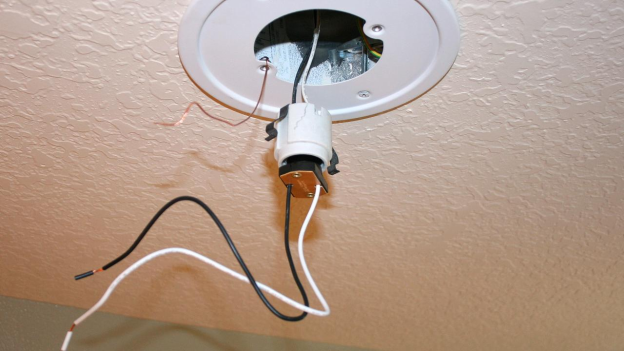
LED Light Fixture Has no Ground – Solution?
In the case where your light fixture has no ground wire, you can do a couple of things to deal with it. Some of these are as follows:
- Look into the instructions in the manual that comes with the light fixture, as it may offer you some guidance regarding the requirements of grounding or how to handle it.
- Make sure to take a look at the local electrical regulations. Some areas have special grounding requirements, and the installation of the fixture must adhere to those requirements.
- In the case where your electrical wiring has a ground wire present in the circuit, you can add a ground wire in the light fixture, too, by connecting the wire from the fixture to the wire in the circuit.
- Some light fixtures also come with grounding screws which help to create a ground connection between the light fixture and the electrical circuit.
- The best approach is to get in touch with a qualified and professional electrician as they know the details and safety concerns; hence, they can offer you the safest solution.
Answer: Do LED Light Fixtures Need to be Grounded?
Whether the LED light fixtures need grounding or not is a matter that depends on various factors, including the application and design of the LED light fixture. Most of the LED lights operate at lower voltages and they do not need grounding because they have double insulation.
It is always suggested to go through the manufacturer’s instructions in this regard and have a look at the light fixture to find any grounding wires.
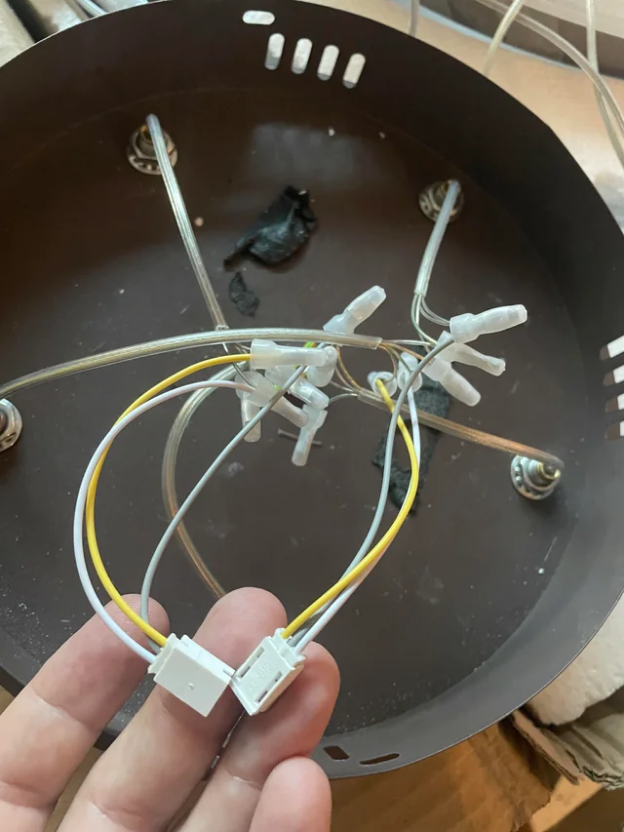
FAQs:
1.Is it OK to not ground a light fixture?
It is not necessary to ground a light fixture; however, if you do that, you can be assured of safety from electrical hazards
2.Where do you ground a light fixture?
In the case where your house has electric boxes made from metal, the fixture’s ground wire is connected to the ground screw. However, if your house has plastic electrical boxes, the ground wire of the fixture connects to the ground wire of the house.
3.Why do light fixtures have a ground wire?
The ground wire is designed for safety purposes. In case the live wire is loose and touches the light fixture, the ground wire diverts the current, and this protects you from an electrical shock.
4.What happens if you wire a light fixture wrong?
In case a light fixture is wired incorrectly, the light will not turn, or the cricut may not get completed. The light may also flicker or get dim due to the lack of secure connections.
5.Do Ceiling Lights Need To Be Grounded?
In a ceiling light, no ground wire is essential; however, if you add one, you can ensure more safety; usually, these lights have double insulation that eliminates the need for grounding.
6. Does An Outdoor Light Need To Be Grounded?
Yes, outdoor lights must be grounded because they are exposed to an outdoor environment that comprises moisture and rain. Hence, if proper grounding of wires is not carried out, the risk of electric shock is there.
7.Do Fluorescent Lights Need To Be Grounded?
As most of the fluorescent lights are made using metal they need to be grounded in order to ensure safety.
8.Do LED Trailer Lights Need To Be Grounded?
Yes, in order to let the LED trailer lights function properly, it is important to ground them.
9. Which Terminal Of LED Should Be Grounded?
The shorter lead of the LED, which is known as the cathode, is the negative terminal, and it needs to be grounded.
10.Do 12 Volt LED Lights Need To Be Grounded?
Not necessarily a 12 Volt bulb needs to be grounded because it is a very low voltage bulb. However, it is always a better idea to go through the manufacturer’s instructions to assess.
11. Is there an earth wire for LED lights?
In general, the LED lights work on a very low voltage, and hence, they may not have an earth wire because grounding is not necessary for them.
12.How to ground the led ceiling light?
You can connect the ground wire from the LED ceiling light to the ground wire in the electrical box with the help of a wire nut.


